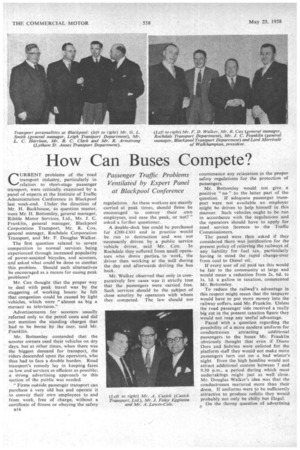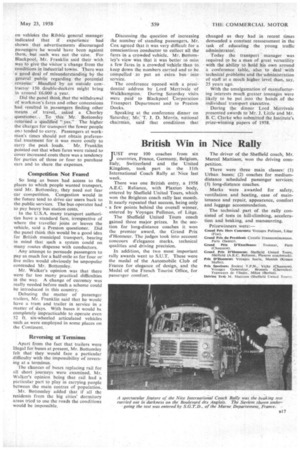How Can Buses Compete?
Page 50

Page 51

If you've noticed an error in this article please click here to report it so we can fix it.
CURRENT problems of the road transport industry, particularly in relation to short-stage passenger transport, were critically examined by a panel of experts at the Institute of Traffic Administration Conference in Blackpool last week-end. Under the direction of Mr. H. Back house, as question master, were Mr. I-I. Bottomley, general manager, Ribble Motor Services, Ltd., Mr. J. C. Franklin, general manager, Blackpool Corporation Transport, Mr. R. Cox, general manager, Rochdale Corporation Transport, and Mr. F. Douglas Walker.
The first question related to severe competition to normal services being experienced through increased popularity of power-assisted bicycles, and scooters, and asked what could be done to combat this problem. Should such alternatives be encouraged as a means for easing peak problems?
Mr. Cox thought that the proper way to deal with peak travel was by the staggering of working hours: he felt that congestion could be caused by light vehicles, which were "almost as big a menace as television."
Advertisements for scooters usually referred only to the petrol costs and did not mention the standing charges that had to be borne by the user. said Mr.
Franklin. .
Mr. Bottomley contended that the scooter owners used their vehicles on dry days, but at other times, when there was the biggest demand for transport, the riders descended upon the operators, who thus had to face a double burden. Road transport's remedy lay in keeping fares as low and services as efficient as possible; a strong advertising approach to this section of the public was needed.
"Firms outside passenger transport can purchase a very old bus and operate it to convey their own employees to and from work, free of charge, without a certificate of fitness or obeying the safety n16 regulations. As these workers are mainly carried at peak times, should firms be encouraged to convey their own employees, and ease the peak, or not?" asked a further questioner.
A double-deck bus could be purchased for L200-1300 and in practice would be run to destruction and was not 'necessarily driven by a public service vehicle driver, said Mr. Cox. In Rochdale they suffered from small operators who drove parties, to work, the driver then working at the mill during the day and afterwards driving the bus back.
Mr. Walker observed that only in comparatively few cases was it strictly true that the passengers were carried free. Such services should be the subject of close scrutiny by operators with whom they competed. The law should not countenance any relaxation in the proper safety regulations for the protection of passengers.
Mr. Bottomley would not give a positive " no " to the latter part of the question. If adequate passenger transport were not available an employer might be driven to help himself in this Manner. Such vehicles ought to be run in accordance with the regulations and the operators should have to apply for road service licences to the Traffic Commissioners.
The panel were then asked if they considered there was justification for the present policy of relieving the railways of any liability for fuel tax, particularly having in mind the rapid change-over from coal to Diesel oil.
If every user of oil paid tax this would be fair to the community at large and would mean a reduction from 2s. 6d. to Is. Id. a gallon in taxation, commented Mr. Bottomley.
To reduce the railwars advantage in this respect might mean that the taxpayer would have to put more money into the railway coffers, said Mr. Franklin. Unless the road passenger side received a really big cut in the present taxation figure they would not reap any useful advantage.
Faced with a question regarding the possibility of a more modern uniform for conductresses attracting additional passengers to the buses Mr. Franklin obviously thought that even if Diana Dors and Sabrina were enlisted for the platform staff they would not make more passengers turn out on a bad winter's night. Even the high hemline would not attract additional custom between 7 and 9.30 p.m., a period during which most undertakings might just as well close. Mr. Douglas Walker's idea was that the conductresses mattered more than their dress. If uniforms were to he sufficiently attractive to produce results they would probably not only be chilly but illegal.
On the thorny Question of advertising
on vehicles the Ribble general manager indicated that if experience had shown that advertisements discouraged passengers he would have been against them, • but such was not the case. For Blackpool, Mr. Franklin said their wish was to give the visitor a change from the conditions in industrial towns. There was a good deal of misunderstanding by the general public regarding •the potential revenue-. Handled by an outside contractor 150 double-deckers might bring in around .E.6.000 a year.
Did the panel think that the withdrawal of workman's fares and other concessions had resulted in passengers finding other• means of travel, asked a Chorley questioner., To this M. Bottomley returned a qualified "yes." The higher the charges for transport the fewer people on tended to carry. Passengers at workman's times should not obtain preferential treatment for it was more costly to carry the peak loads. Mr. Franklin pointed out that when fares were raised to cover increased costs there was a tendency for parties of three or four to purchase cars and to share the expenses.
Competition Not Feared
So long as buses had access to the places to which people wanted transport, said Mr. Bottomley, they need not fear car competition. Congestion would in the future tend to drive car users back to the public services. The bus operator had to pay heavy bus station costs.
In the U.S.A. many transport authorities have a standard fare, irrespective of where the traveller joins or leaves the , vehicle, said a Preston questioner. Did the panel think this would be a good idea for British municipal transport, bearing in mind that such a system could on many routes dispense with conductors.
Any attempt to persuade passengers to pay as much for a half-mile as for four or five miles would obviously be unpopular contended Mr. Bottomley.
Mr. Walker's opinion was that there were far too many practical difficulties in the way. A change of currency was really needed before such a scheme could be introduced in this country.
Debating the matter of passenger trailers, Mr. Franklin said that he would have a tram and trailer in service in a matter of days. With buses it would be completely impracticable to operate even 52 ft. six-wheeled articulated vehicles such as were employed in some places on the Continent.
Reversing at Terminus
Apart from the fact that trailers were illegal for buses at present, Mr. Bottomley felt that they would face a particular difficulty with the impossibility of reversing at a terminus.
The chances of buses replacing rail for all short journeys were examined, Mr. Walker's opinion being that rail had a particular part to play in carrying people between the main centres of population.
Mr. Bottomley added that if all the residents from the big cities' dormitory areas tried to use the roads the conditions would be impossible. Discussing the question of increasing the number of standing passengers. Mr. Cox agreed that it was very difficult for a conscientious conductor to collect all the fares in a crowded vehicle. Mr. Bottomley's view was that it was better to miss a few fares in a crowded vehicle than to keep down the numbers carried and to be compelled to put an extra bus into service.
The conference opened with a presidential address by Lord Merrivale of Walkhampton. During Saturday visits were paid to Blackpool torporation Transport Department and to Preston Docks.
Speaking at the conference dinner on Saturday, Mr: T. J. D. Morris, national chairrnan, said that conditions that changed as they had in recent times demanded a constant reassessment in the task of educating the young traffic administrator.
Today the transport manager was required to be a man of great versatility with the ability to hold his own around a conference table, also to deal with technical problems and the-administration of staff at a much higher level than, say, 25 years ago.
With the amalgamation of manufacturing interests much greater tonnages were likely to be put into the hands of the individual transport executive. • During the dinner Lord Merrivale presented awards to Mr. J. Little and Mr. B. C. Clarke who submitted the Institute's prize-winning papers of 1958.
























































































